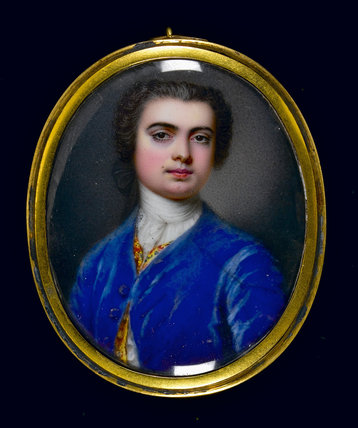
Miniature by William Prewitt
Farinelli, the great superstar castrato singer was born on this day in 1705. He was one of the thousands of boys (maybe four thousand a year) subjected to the inhuman practice of castration, which was technically illegal in Italy, to preserve their voices. He was also one of the few who attained international fame. He was brought to England in 1733 by Handel, and became a sensation. Shortly after, still in his early 30s, he left to join the court of King Philip V of Spain, his singing having cured the monarch of his depression and did not sing in public again.
So what did he sound like? You can, if you poke around online, find a recording of Alessandro Moreschi, made in 1902. Moreschi was way past his prime, and the recording is pretty bad. He didn’t have an operatic voice and he sounds nervous and wobbly, although it is in its way impressive, even if only as a piece of history.
With the interest in HIP (historically-informed performance) there’s naturally a resurgence in the castrato repertoire. The amazing Vivica Genaux brought out a CD some years ago of Farinelli’s greatest hits. You can hear soundbites of Genaux and other singers, at Arias for Farinelli. It is very difficult virtuoso music, both in the vocal range and the demands it makes physically upon the singer.
Composer Johann Joachim Quantz commented:
Farinelli had a penetrating, full, rich, bright and well-modulated soprano voice, with a range at that time from the A below middle C to the D two octaves above middle C. … His intonation was pure, his trill beautiful, his breath control extraordinary and his throat very agile, so that he performed the widest intervals quickly and with the greatest ease and certainty.
Charles Burney said
The first note he sung was taken with such delicacy, swelled by minute degrees to such an amazing volume, and afterwards diminished in the same manner to a mere point, that it was applauded for full five minutes. After this he set off with such brilliancy and rapidity of execution, that it was difficult for the violins of those days to keep pace with him… [he] could hold his notes for such a long time that those who heard him believed that it was impossible to do so naturally. They believed he hid a special instrument which maintained the sound of his voice whilst he took another breath.
Burney was also impressed with Farinelli’s emotional impact:
Senesino had the part of a furious tyrant, and Farinelli that of an unfortunate hero in chains; but in the course of the first air, the captive so softened the heart of the tyrant, that Senesino, forgetting his stage-character, ran to Farinelli and embraced him in his own.
In the movie Farinelli, his voice was recreated by digitally morphing that of Ewa Mallas-Godlewska (soprano) and Derek Lee Ragin (countertenor).
In London shortly after his appearance, public taste changed. Opera seria, the lofty, formal style devoted to tales of mythological and classical characters simply became too silly to be taken seriously. John Gay’s The Beggar’s Opera, incorporating popular song and starring rogues and tarts, became wildly popular. Handel gave up opera–even Farinelli couldn’t save that sinking ship–and devoted himself to writing oratorios. A new generation of composers transformed operas.
The occasional castrato did appear on the London stage, such as Giovanni Battista Velluti who sang in Meyerbeer’s Il Crociato in 1825, possibly the last opera written with a castrato role. But it was the last gasp.
Here’s more on Farinelli and the castrati:
Lack of testes gave castrato superstar headaches (New Scientist)
Singing in the pain (BBC News)
A tear in each note and a sigh in each breath (Georgian London)
BBC Documentary, Castrato (Part 1. The exhibit at the Handel Museum is no longer on show) If you are squeamish skip the first minute of Part 2. In fact, skip most of Part 2.
Farinelli excerpt, aria from Rinaldo by Handel.
I’d love to time travel and hear Farinelli sing. Who would you like to see perform?

Great post! Like you I would love to travel back in time and hear Farinelli sing! I would also like to hear the famous English tenor John Braham (1774-1856) He debuted at the end of the era of the castrati and was seen as a replacement for them in many ways. He sang both English and Italian opera. His ornamental style was seen as an attempt to mimic the castrati, but once he came into his own he was a force to be reckoned with on opera stages in England and on the Continent.
Another singer I would love to have heard is Maria-Felicia Garcia Malibran (!808-1836,) one of the first truly great contraltos.
I would like to have seen Franz Liszt perform as he was something of a rock star in his day.
I would love to have seen a live performance of Maria Callas as Medea.
Yes, this is a subject near and dear to my heart.
Have you listened to Cecelia Bartoli’s “Sacrificium”? Arias originally written for castrati, it’s great (even though not quite the same, since she is a female mezzo LOL)
@Amanda McCabe/Laurel McKee, I haven’t heard Bartoli’s recording, I’ll have to check it out.
@Louisa, I think Braham may have been mentioned in the BBC documentary. They said he developed a technique of dropping his larynx so he could really belt!
Thank you for a most interesting post. I am shocked at the number of young boys (4,000 a year) castrated. Surely they didn’t need that many to sing in choirs. I am also surprised that the practice continued so far into the 19th century.
Not a singer, but I would love to go back in time and see Mozart perform..